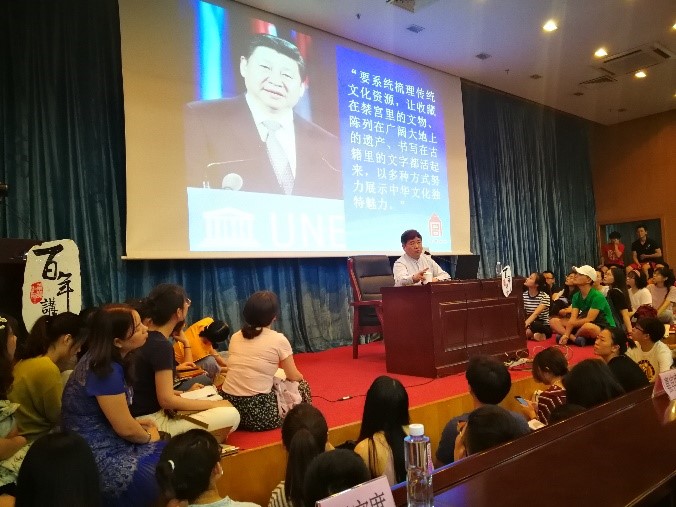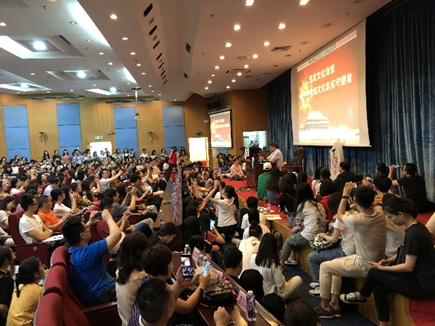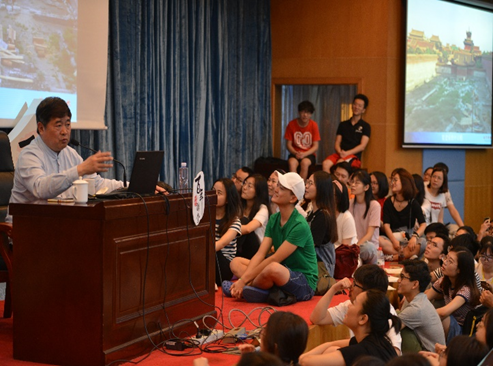- ABOUT JNU
- ADMISSION
-
ACADEMICS
- Schools and Colleges
-
Departments and Programs
- Arts College of
- Chinese Language and Culture College of
- Economics College of
- Electrical and Information Engineering College of
- Foreign Studies College of
- Information Science and Technology College of
- Environment School of
- Humanities School of
- International Business School
- International Studies School of
- Journalism and Communication College of
- Law School
- Liberal Arts College of
- Life Science and Technology College of
- Management School of
- Marxism School of
- Medicine School of
- Pharmacy College of
- Physical Education School of
- Science and Engineering College of
- Shenzhen Tourism College
- Research Institute
- Research Center
- Programs in English
- Majors
- Study Abroad
- Online Learning
- RESEARCH
- CAMPUS LIFE
- JOIN US
Latest News
Palace Museum's Former President Lectures at JNU
Time: May 24, 2019
Source: News Center
Shan Yuxiang, former president of the Palace Museum at the Forbidden City in Beijing, spoke at JNU on May 23 as part of the university's Cultural Quality Education Lecture Room series. In the 12th lecture in a series spreading and promoting traditional Chinese culture, he lectured on Strengthening Cultural Confidence and Being a Loyal observer of Chinese Culture. More than 600 teachers and students attended, and those on other campuses watched through on-campus live streaming.
Shan is the dean of the Forbidden City College, president of the Chinese Cultural Relics Association and former director of the State Administration of Cultural Heritage. During his two-and-a-half-hour lecture, thunderous applause and laughter sounded more than 30 times. With rich knowledge and great humor, Shan comprehensively introduced a series of reform measures and practical experiences at the Palace Museum in recent years in the contexts of public service, the restoration of cultural relics, the digitization of cultural relics, and cultural and creative industries. With exquisite pictures and vivid examples, he brought everyone closer to the Palace Museum's grandeur and splendor.

(Shan lecturing)
When Shan took office in 2012, only 30 percent of the Palace Museum's area was open to the public; fewer than 1% of its holdings were seen by the audience, and the rest gathered dust in the warehouse. Seven years later, 80% of the area was open to the public. The museum's entire collection of 1,862,690 cultural relics was posted online, and the audience could see the details on any of them.
During Shan's seven years in office, which were also the seven years of reform and opening up of the Forbidden City, the 600-year-old Forbidden City became a new Internet celebrity, a cultural intellectual property in the forefront of the times, and an important model for. enlivening traditional culture.

(The packed lecture scene)
With unique school historical and cultural characteristics, JNU Museum is a public cultural and educational space for teachers and students. In the future, the Palace Museum's cultural creations will also have the opportunity to be exhibited in the JNU Museum, said Prof. Wang Yintian of the College of Literature, who presided over the lecture. He said cultural communication needs carriers, and university museums can help teachers, students and the public feel the characteristics and charm of culture more vividly.

(The packed lecture scene)
NEWS
- About the University
- Quick Links
Copyright © 2016 Jinan University. All Rights Reserved.




